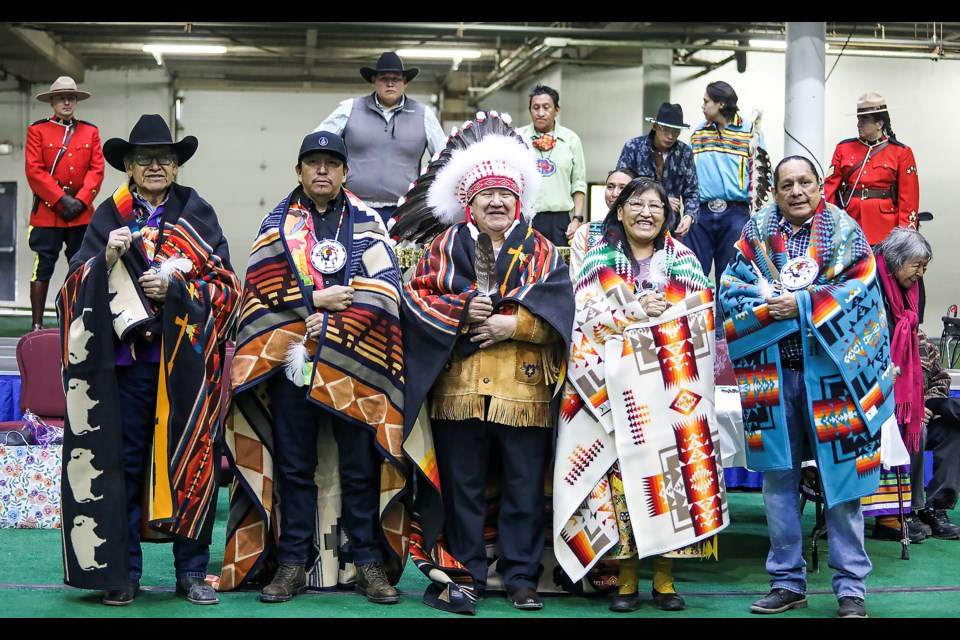ÎYÂRHE NAKODA – A new four-year term for the Goodstoney First Nation band council has begun, and it’s off to a fast start.
Between preparing for the opening of a major retail development, allocating recently announced substantial housing supports, and a host of other upcoming projects, Goodstoney band council and its majority of new electees will be ‘good busy’ for the foreseeable future.
In an inauguration ceremony at the Goodstoney Rodeo Centre Feb. 3, re-elected Chief Clifford Poucette, joined by Couns. Krista Hunter, Watson Kaquitts, Desi Ear and Thomas Dixon, as well as other members of Stoney Tribal Council, celebrated what’s to come for the First Nation, while giving credit to the previous council.
“We have good stride right now,” said Poucette. “We have a lot on the go and we’re continuing to look outside the box with economic development initiatives to strengthen our community.”
Goodstoney Meadows, a Nation-owned 1.61-hectare retail development about four years in the making, was announced in July 2022 with a ground-breaking ceremony at the site near Stoney Nakoda Resort and Casino and the Bearspaw Travel Centre off Highway 40.
When it is complete, the development will include two buildings and over 100 parking spots, accommodate a gas bar, convenience store, take-out area and drive-thru, four retail locations, huge public washrooms, outdoor food court, a nearby playground, and a towering tipi light fixture.
The chief said job creation and training opportunities are key focuses of Goodstoney council, and Goodstoney Meadows will provide many employment opportunities for Nation members, with another 1.61 hectares of space for potential future developments. The development site is along one of Canada’s busiest tourist corridors on Highway 1, connecting nearby Kananaskis Country, Banff and Canmore to Calgary.
But the visitor economy isn’t the only industry where the Nation has made major investments in recent years. Nation-owned Goodstoney Aggregate Pit began operating in 2022, supplying gravel mined from reserve lands for upgrades and repairs to Highway 1A, and other developments on and off Îyârhe Nakoda lands.
In November, Goodstoney council announced it, along with Chiniki council, had partnered up with ATCO on what will become western Canada’s largest urban solar project. Approximately 21,000 tonnes of aggregate from Goodstoney Aggregate and Nakoda Oil and Gas will be used toward the Deerfoot and Barlow solar projects in Calgary, commencing in 2023.
The combined projects will use 175,000 solar panels and will generate enough renewable energy to power more than 18,000 homes and offset 68,000 tonnes of carbon a year.
Gravel is also being used for road maintenance and home construction in Îyârhe Nakoda First Nation communities.
On the day of the Goodstoney council inauguration, the federal government announced funding of more than $13 million through the Rapid Housing Initiative to be made available to Goodstoney and Chiniki First Nations, as well as O’Chiese First Nation northwest of Rocky Mountain House.
While it is not yet clear if Goodstoney Aggregate may play a role in construction, the funding is expected to support the immediate building of 44 homes and the renovation of four others across the First Nations’ communities.
“Our Nations’ population is growing very rapidly and these units will be greatly appreciated by the new occupants,” said Poucette in a statement announcing the funding. “The Goodstoney Nation has always had a very good working relationship with the [Canada Mortgage and Housing Corporation] CMHC and hope to continue this in the future.
“The Goodstoney Nation is also looking at participating in the upcoming CHMC and other federal government housing initiatives to make the Goodstoney Nation a better place to live for its members.”
Poucette stressed the importance of Goodstoney council working together to continue addressing housing and employment needs in the community throughout this term, while recognizing the challenges and benefits of working with a slate of mostly new council members.
“I know how it works when you don’t have full support and people butt heads – it can be challenging,” he said. “But we need to support each other in the best interest of the community. And we need to continue doing the same with Chiniki and Bearspaw.”
Hunter was re-elected to serve a second consecutive term as councillor, while Dixon, Ear and Kaquitts were all newly elected to Goodstoney band council. Kaquitts, an Îyârhe Nakoda elder, previously served on council in 1992 and has been a vocal advocate for addressing the opioid crisis across Îyârhe Nakoda First Nation communities.
Poucette was voted in to serve a second consecutive four-year term as chief with 260 votes – 49 more than runner-up Tater House. Also in the running was Hank Snow, who lost his seat on council in the run for chief, garnering 152 votes, and former Chief Ernest Wesley, with 77 votes.
The Local Journalism Initiative is funded by the Government of Canada. The position covers Îyârhe (Stoney) Nakoda First Nation and Kananaskis Country.



